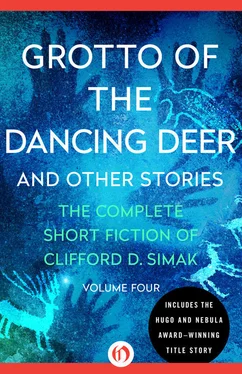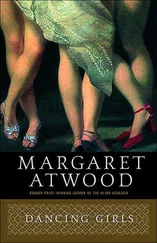But, ill-equipped as he might be, he owed it to the town to have a go at it at least. That was the hell of it—he owed it to the town! All his life he had owed everything he was and ever hoped to be to the people of this little town in payment for the trust that they had in him. He had placed them in his debt, but they had placed him in even greater debt. Just walking in and talking with him cured half of what was wrong with them, and how did a man respond to a faith like that? They thought he had all the answers, so he could not tell them how few answers he did have. Their faith in his infallibility often was the one last resort they had going for them. They put their faith and trust in him, and in doing that they made him feel guilty when he was forced, through inadequacy, to betray that faith and trust. How, he wondered, was a man trapped? How had he allowed himself to be trapped into such a situation?
He dug into the desk drawer and brought out his notes and those of Dr. Smith. Carefully, he went through them, hoping that further study might give him a clue. But there seemed none.
Hormones? he wondered. Some sort of hormonal imbalance? If that were true, however, there would have to be something to have brought about such an imbalance. This was not the first time he had thought of hormones, for an imbalance of insulin would explain the diabetic symptoms; but the hell of it, he reminded himself, was that it had not been diabetes. Glucogen, perhaps? But the trouble there was that no one knew for certain what glucogen really did, although it was suspected that by elevating the glucose blood level it might kill appetite. The hypothalamus? he asked himself. Or the steroid hormones? No, it could be none of these.
Personality disturbances? Fine as far as obesity and irritability might be concerned, but certainly not for any of the other symptoms. And, anyhow, personality disturbances were slimy things to work with and psychiatric training was required to cope with them.
Enzymes? Vitamins? Trace elements?
He was going at it wrong, Benton told himself. He was going at it backward. The way to work out the syndrome was to find a common factor that might be the cause and then try to cipher out what effect the factor had. Although, still thinking of it backward, the enzymes might hold more promise than any of the others. Enzymes basically were catalysts that sped up biochemical reactions. Not that biochemical reactions could not occur without the enzymatic catalytic action, but the reactions would be so slow that the body could not function.
He sat quietly and ran through his mind what he could recall about enzymes. He was surprised to find that after all the years he had scarcely thought of enzymes, he could remember so much about them. The reason that he could recall so much was that instead of thinking directly about enzymes he found himself recalling Professor Walter Cox—old Stony Cox, eccentric and beloved in a rather ragged way—who had paced up and down when he lectured, bobbing like a ball, his head hunched forward between skinny lifted shoulders, punching the air with one clenched fist to emphasize his words. He wondered where Stony Cox might be this night. More than likely dead, he thought, for that had been more than thirty years ago and he had been an old man then.
Thirty years and all, the words came clearly to mind. “The enzymes,” Cox had said, jabbing wildly at the air, “are made up of apoenzymes and coenzymes, the two forming a loose bond to make up an enzyme. The coenzyme normally is a vitamin plus another organic molecule, bonded together. And now, gentlemen, today I ask that you focus your attention on a single coenzyme, the coenzyme A, which is directly involved in two biochemical cycles, the fatty-acid cycle and the citric-acid cycle …”
Benton sat limp in his chair, shaken by what his mind had conjured up, dredging out of a past that measured more than thirty years an instant of almost complete recall—not of the man alone but of the words he had spoken, the slanted shine of sunlight through the slatted blinds, the smell of chalk dust in the air—hearing the words perhaps more distinctly than he had heard them at the time.
Was it a sign? he wondered. Had his subconscious mind reached back and laid a bony finger on this isolated incident to tell him what his conscious reasoning could not tell him?
The phone rang and it was not until the third ring that he realized what it was. Almost as if in a dream, he reached out for it.
“Hello,” he said. “Dr. Benton here.”
“Are you all right?” Harriet asked.
“Sure, I am all right.”
“Do you know what time it is?”
“No. No, I hadn’t noticed.”
“It’s two o’clock,” Harriet said. “I became concerned about you.”
“I’m sorry, dear,” he said. “I’ll be right home.”
5
Late in the fall, Ezra Pike stopped by the office, not because he was sick, but because he had butchered one of his hogs and was bringing Benton a sack of sausages, Mrs. Pike being known throughout the valley as an expert sausage maker. Regularly, each fall at butchering time, Pike came by with a sack of sausages for old Doc.
It was one of the regional eccentricities that Benton had finally become accustomed to, although it had taken him a while. Over the course of any year, a lot of people would come by with something for old Doc—a bag of black walnuts, a basket of tomatoes, a clutch of fancy baking potatoes, a comb of honey fresh from the hive—free-will offerings that Benton had learned to accept with considerable grace.
Although patients were waiting, Benton had Pike step into his office and settled down for a chat with him. Toward the end of their talk he asked the question he had wanted to ask.
“What do you know about the Barr family?”
“You mean the ones that bought Abner Young’s place?”
“Those are the ones,” said Benton.
“Not really much,” Pike answered. “They come from Ohio, I think. Were farmers there. Don’t know why they moved here. I know Barr pretty well and have talked with him, but he never told me and I never asked. Maybe because they got Abner’s place dirt cheap. When Abner died, the farm went to some shirttail relatives out in California—nephews, I gather. They didn’t want to be bothered with it. They never came for the funeral or to settle the estate. They told Abner’s lawyer to sell it for what he could get as soon as he could, and he offered it cheap.”
“So that was the way of it. I never really got to know Abner. He was in a couple of times. A crusty old customer. Once he had a foot infection. Stepped on a nail, the way I remember it. The other time he was on the verge of pneumonia. I tried to get him to let me send him to a hospital, but he wouldn’t do it. Wound up that I gave him some drugs and he went home and managed to live through it. Didn’t see him after that, didn’t really hear much about him until I heard he died. Found dead by one of the neighbors, wasn’t he? Probably he got sick and figured he wanted no more to do with me. Afraid I might send him to a hospital. Likely neither myself nor a hospital could have helped him much. He was one of those characters who fought a doctor tooth and nail.”
Pike chuckled, remembering his neighbor. “I know people said he was a mean man, and in some ways I suppose he was. Ran people off his place with a shotgun. The pheasants were knee-deep in his fields and he would allow no hunting. Wouldn’t even shoot them himself. Never had much to do with his neighbors. Kept to himself. He’d gone sour on humanity. But he loved other things. He let his fence rows grow up to brush so that rabbits and woodchucks and birds would have a place to live. He always fed the birds in winter, and if English sparrows or blue jays came to feed he never tried to drive them off, or was put out about it the way a lot of people are. Said they got hungry, too.”
Читать дальше












